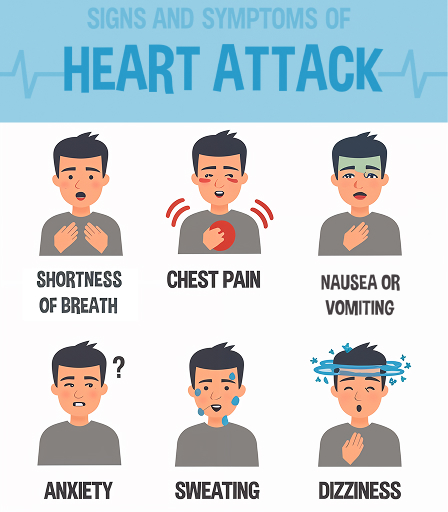Table of Contents

Heart symptoms don’t always appear suddenly or severely, but early detection remains vital. Getting medical help right away reduces both life-threatening outcomes and medical emergencies. This guide outlines when you need to seek medical assistance and which heart symptoms to watch out for.
Speak with your doctor if you notice any persistent or unusual heart-related symptoms. Getting medical help right away allows for better outcomes and results, and reduces the risk of complications.
Seek emergency help right away if you experience:
Some heart problems begin with mild or non-specific symptoms. Paying attention to these early signs can help prevent more serious conditions:

Did you know? One in every five heart attacks happens without noticeable symptoms.
Heart disease causes more deaths among Indian women than any single type of cancer, including breast cancer. Women experience specific symptoms during heart attacks that differ from men’s., so it’s vital to recognize them.
To understand the difference between heart attack and cardiac arrest, read our detailed guide: Signs of Heart Attack vs. Cardiac Arrest
Contact emergency services if:
Visit a doctor if:
Monitoring your body’s warning signs helps lead to better heart health and survival rates. If you notice chest discomfort, fatigue, or jaw pain, especially when combined with other heart disease symptoms, don’t wait! Seeking help early improves your chances of recovery and helps save lives. When in doubt, always choose safety.
Conclusion
Paying attention to your body scan leads to crucial progress in protecting and maintaining good heart health. Symptoms like chest discomfort, unexplained fatigue, and jaw pain/discomfort, combined with heart disease indicators, may signal a heart problem that requires urgent medical attention.
Take action now! Early Treatment is always safer than waiting. For expert cardiac care, visit the emergency department as well as get a cardiac consultation at Dr. Mehta’s Hospitals to explore our heart health services or reach out through the details below.
You can also book an online appointment for a cardiac consultation or reach out through our contact us for more details.
Early action always produces safer results than waiting too long. Take safety measures today to protect your heart health.
Q: Can heart attack symptoms come and go?
A: Yes. Symptoms may appear briefly and then fade. If they persist or return, seek medical care immediately.
Q: Are heart attack symptoms different in women?
A: Yes. Women may have less obvious symptoms like fatigue, nausea, or back pain instead of classic chest pain.
Q: What should I do if I think I’m having a heart attack?
A: Call emergency services immediately. Do not drive yourself to the hospital
.Q: Can anxiety mimic heart attack symptoms?
A: Yes. Anxiety can resemble heart attack symptoms, which is why medical evaluation is essential to rule out serious issues.
Q: How can I reduce my risk of a heart attack?
A: Maintain an active lifestyle, eat a balanced diet, manage stress, and attend regular health check-ups.
Table of Contents
Recent Post
About us
Dr. Mehta’s Hospitals is a leading multispecialty hospital in Chennai with over 90 years of excellence. With 400+ beds and 80+ specialties, its Chetpet and Velappanchavadi centers offer advanced, state-of-the-art, compassionate care under one roof.
Chetpet Contact Details
Velappanchavadi Contact Details
Feel free to ask your queries on
Our Specialities
About us
Dr. Mehta’s Hospitals is a leading multispecialty hospital in Chennai with over 90 years of excellence. With 400+ beds and 80+ specialties, its Chetpet and Velappanchavadi centers offer advanced, state-of-the-art, compassionate care under one roof.
Chetpet Contact Details
Velappanchavadi Contact Details
Feel free to ask your queries on
Our Specialities
Quick Links
Center Of Excellence